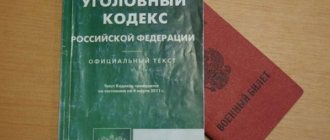Fraud is a type of theft that is committed by deceiving the victim or abusing his trust.
What damage must occur for a criminal case to be filed? This article provides answers to many questions regarding this problem. You will also find the answer to the question: how much damage from fraud is legally significant and implies liability?
Determination of types of damage according to the Criminal Code of the Russian Federation and the Code of Administrative Offenses
The Code of Administrative Offenses of Russia does not divide theft into types. There is Art. 7.27, which establishes liability for minor:
- theft (what is the difference between fraud and theft?);
- fraud (we talked more about petty fraud here);
- embezzlement, embezzlement, and so on (read about the features and differences between fraud, embezzlement and embezzlement here).
In Part 1 of this Art. It is stated that the value of the stolen property must be no more than 1,000 rubles in order for a person to be charged under this part of Art. 7.27. But there is also part two, which establishes liability for petty theft of property, the value of which is estimated at over 1000, but up to 2500.
In part 1 of Art. 159 of the Criminal Code of Russia does not indicate what amount of damage is considered significant, that is, from which criminal liability begins.
But in the note to Art. 158 of the Criminal Code of the Russian Federation (since both fraud and theft use the same concepts about the amount of damage) the following concepts are disclosed:
- significant damage - at least 5,000 rubles;
- large-scale theft - over 250,000 rubles;
- especially large size – over 1 million.
More information about large-scale and especially large-scale fraud is presented in our article.
Obvious conclusions arise regarding the payment of fines:
- If as a result of the criminal’s actions the damage amounts to up to 2,500, then the culprit may be held accountable under the Code of Administrative Offences.
- If the amount of damage is more than 2,500, then criminal liability may already arise for fraud.
The Criminal Code of the Russian Federation has Art. 158.1, according to which persons are punished who have “pulled off” the theft of property in the amount of 2,500 not for the first time . Thus, if a fraudster once committed an administrative offense and was prosecuted under the Code of Administrative Offenses of the Russian Federation, then the second time for the same act he will be punished under an article of the Criminal Code of the Russian Federation.
Our experts have prepared for you information about various types of fraud, including in the field of real estate, computer information, social benefits and using electronic means of payment.
Differences from embezzlement and embezzlement
Speaking about fraud committed with the use of official position, we must not forget that another crime under Art. 160 of the Criminal Code of the Russian Federation – misappropriation or embezzlement. Moreover, Part 3 of this article has the same qualifying feature - the use of official powers.
How to distinguish these two compositions from each other? The key difference here is:
- In the case of misappropriation or embezzlement, there is a legally formalized relationship between the criminal and the victim, as a result of which material assets were handed over to the perpetrator for storage or temporary use.
- In case of fraud, the criminal has no legal grounds for obtaining property. There is no legal relationship between the perpetrator and the victim; all their contact is based solely on trust.
Features of an act with damage from 2500 to 5000 rubles
Responsibility for an act with such an amount of damage occurs under Part 1 of Art. 159 of the Criminal Law. But this is not obvious to everyone. As stated above, in parts 2, 3 and 4 of this article. We are talking about a specific amount of damage.
Or rather, they include: significant damage, large size and especially large. How much is this in money - says the note to Art. 158 of the Criminal Code.
What amount of damage will be considered large for a person to be convicted under Part 1 of Art. 159? You can install it by elimination. The maximum damage under the Code of Administrative Offenses is 2,500 rubles . Significant under the Criminal Code (Part 2. 159 of the Criminal Code of the Russian Federation) - over 5000. Consequently, liability for fraud with damage from 2500 to 5000 rubles occurs under Part 1 of Art. 159 of the Criminal Code.
Significant damage does not always start from 5,000 rubles. When determining it, the financial situation of the victim is taken into account.
For example: scammers stole a fairly simple smartphone from the director of a large oil company, the cost of which is 5,990 rubles. The victim's monthly income is almost 1 million. Obviously, in this case, significant damage was not caused to him.
Corpus delicti
According to the mentioned paragraphs of Article 159, the object of the crime is the contractual relations of the parties who entered into a transaction. The role of the subject is played by the entrepreneur, the organization.
The objective side of the crime committed is the fact of non-fulfillment of agreements, and the subjective side is the direct intent that initially arose on the part of the guilty party.
To initiate criminal prosecution, you must first prove the presence of deliberate intent to commit fraudulent acts. Additionally, the following conditions must be met:
- The defendant must be over 18 years of age;
- The accused must be officially registered as an individual entrepreneur or hold the position of head of a company/organization with the authority to enter into transactions;
- The applicant must have a legal cooperation agreement;
- The court must be provided with documents confirming the failure of the potential culprit to fulfill the agreement.
Legal proceedings can be initiated against an individual who is in a management position, as well as against a member of the company's management.
Types and methods of fraud in business
In addition to failure to fulfill the terms of the contract, there are other criminal acts that constitute business fraud:
- Excess of official authority, deliberate overestimation of the functions of the organization by its leader. This includes entering into transactions that exceed the limits for a particular position.
- Signing contracts that contradict Russian legislation. Such transactions are declared invalid, and everything received by the fraudsters through them is collected by the state or returned to the injured party.
- Attribution of services that were not actually provided or received by the counterparty. Traditionally, for this purpose, fake payment documents are used.
- Issuing loans with hidden fees written in the smallest, almost inaccessible font.
- Execution of loans secured by company property by a person who does not have the right to do so. Such a transaction becomes invalid.
The role of the receipt
Having a receipt in hand, you can go to court with a statement of claim. If the receipt is correctly drawn up, the court will recover money from the debtor, but it is unknown whether the creditor will receive his money. As a rule, the scammer does not have money.
If there is a receipt, there are no grounds for initiating a criminal case . Everything looks like a civil law relationship and there is no criminal intent.
If we consider the case in relation to one receipt, then the intent to commit fraud cannot be proven. But if you evaluate ten or twenty receipts, you will see ongoing fraud with direct intent.
General types of evidence
The collection and assessment of evidence is carried out during the investigation of a criminal case . The evidence with the help of which conclusions are drawn is listed in the Criminal Procedure Code of the Russian Federation. They are divided into types:
- Testimony of the accused, suspect.
- Conclusion and testimony of a specialist and expert.
- Records of judicial and investigative actions.
- Testimony of a witness, victim.
- Evidence.
- Other documents.
- Testimony of the accused, suspect . During the investigation, a suspect is identified. He is being interrogated. If there is evidence, they are charged and interrogated as an accused. The suspect-accused has the right not to testify, to admit or deny guilt. The chosen position is assessed by the investigator and the court.
- Conclusion and testimony of a specialist and expert . If necessary, a specialist in any field of knowledge may be involved in the investigation or an examination may be assigned. If there is any ambiguity in the specialist's report or the expert's conclusions, they are questioned.
- Records of judicial and investigative actions . A protocol is drawn up for such investigative actions as inspection of the crime scene, examination, seizure, search and a number of others. All actions reflected in the protocol are subject to evaluation and influence the recognition of a person as guilty or innocent.
- Testimony of a witness, victim . A witness or victim may make a mistake or misunderstand something. On the same fact, different witnesses may give contradictory testimony. However, witness statements in a criminal case are important evidence. Often a conviction is based on their testimony.
- Physical evidence is any object of the material world that contains information about the crime committed. They can be: things and valuables obtained by criminal means (money, precious metals). Physical evidence is difficult to falsify - it is the most objective evidence.
- Other documents . These include various kinds of certificates, acts, characteristics and personal letters. Documents can be on paper or in photographs and videos.
Relevance and admissibility of evidence
According to Art. 59 of the Code of Civil Procedure of the Russian Federation “The court accepts only that evidence that is important for the consideration and resolution of the case.” Materials not related to the circumstances of the case are excluded from the list of evidence. The remaining evidence must be admissible.
Inadmissible evidence is listed in Art. 75 of the Criminal Code of the Russian Federation . They cannot be used as the basis for the accusation, but they cannot become evidence for the defense. This evidence has no legal force. The law refers to the following evidence:
- Testimony of a suspect or accused, given during the pre-trial investigation in the absence of a defense lawyer and not confirmed in court.
- Testimony of the victim, witness based on guesses, rumors, assumptions.
- Testimony of a witness who cannot confirm the source of his knowledge.
- Items, documents and information included in the lawyer’s proceedings.
- Other evidence obtained in violation of the law.
All interrogations of the suspect or accused must be carried out with the participation of a defense lawyer with whom an agreement has been concluded. Even in the event of a written refusal from the defense attorney, all interrogations of the suspect or accused will be inadmissible evidence.
Rumors, conjectures, assumptions cannot be used as the basis for accusations. Accordingly, the testimony of a witness and a victim based on conjecture cannot be admissible. A witness can talk at length and interestingly about something, but still not say how he knows it. Such a fruit of a far-fetched story cannot be recognized as evidence.
Since 2021, the law has prohibited the inclusion of evidence presented by a lawyer in criminal cases. The investigator is in charge of the case and collects evidence . A lawyer can act through an investigator or a court. Evidence collected by a lawyer independently is considered inadmissible.
The last fifth point of the list of inadmissible evidence includes other evidence obtained in violation of the law. This point is quite broad. It covers almost any evidence that was obtained in violation of the law. For example:
- evidence of criminal activity obtained as a result of a search conducted without witnesses;
- valuable documents obtained as a result of a seizure made by an investigator who was not allowed to participate in the proceedings.







